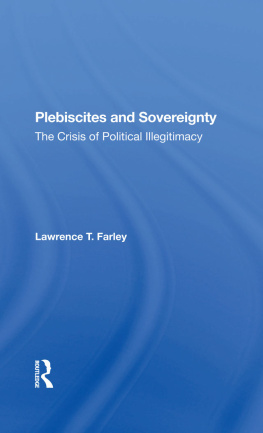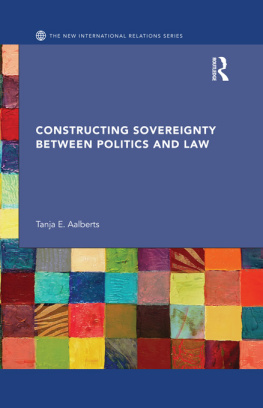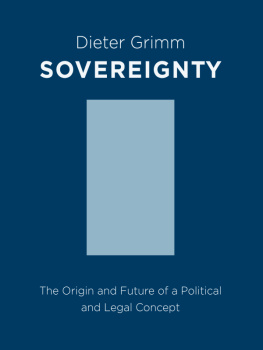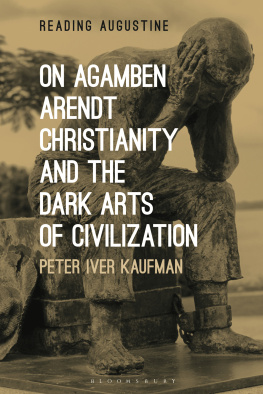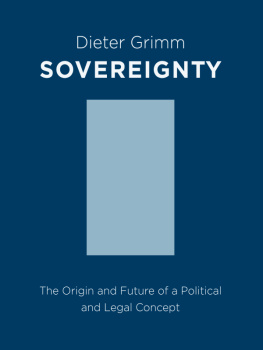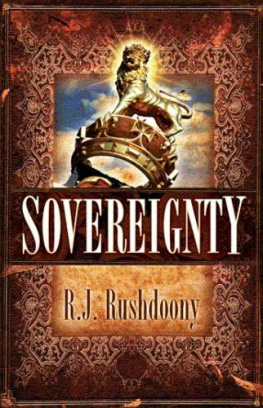THE STATE OF SOVEREIGNTY
Lessons from the Political Fiction of Modernity
PETER GRATTON
S TATE U NIVERSITY OF N EW Y ORK P RESS
Published by
S TATE U NIVERSITY OF N EW Y ORK P RESS
2012 State University of New York
All rights reserved
Printed in the United States of America
No part of this book may be used or reproduced in any manner whatsoever without written permission. No part of this book may be stored in a retrieval system or transmitted in any form or by any means including electronic, electrostatic, magnetic tape, mechanical, photocopying, recording, or otherwise without the prior permission in writing of the publisher.
For information, contact
State University of New York Press, Albany, NY
www.sunypress.edu
Production, Kelli W. LeRoux
Marketing, Anne M. Valentine
Library of Congress Cataloging-in-Publication Data
Gratton, Peter.
The state of sovereignty : lessons from the political fictions of modernity / Peter Gratton.
p. cm. (SUNY series in contemporary French thought)
Includes bibliographical references and index.
ISBN 978-1-4384-3785-9 (hardcover : alk. paper)
1. Sovereignty. I. Title.
JC327.G735 2011
320.1'5dc22
2011004151
10 9 8 7 6 5 4 3 2 1
For Brad, father and son
ACKNOWLEDGMENTS

As the eighteenth century began, a century known both for the light of the lumires and the darkness of the Terror, the Comte Henri de Boulainvilliers settled into the privacy of his office to prepare a volume on sovereignty. This work would be a part of his livre de raison (a combination genealogy and accounts book), which he thought would be read only by a few (in particular, his elder son) and remain largely undisturbed alongside other dusty materials in his library, just a few feet away from where he wrote. These writings would become important later to Foucault and Arendt in their histories of nationalism since Boulainvilliers charted out not only his family finances, but prefaced it with a thousand-year history of the French nation he thought to be the rightful ruler of Francenot the Bourbon line in the person of Louis XIV. The Dissertation sur la noblesse de France would be published clandestinely in Amsterdam some thirty years later, long after one son for whom he wrote had died in battle for the Sun King, and its early pages on the state of sovereignty and its political fictions make for pitiable reading: the money was gone, debts were piling up, the sovereign ruled absolutely, and war seemed to be breaking out just about everywhere. I begin this work, he noted in words familiar to anyone writing acknowledgments, from the point of view of a personal justification that I believe is owed to my family.
This book is the only accountingperhaps barely a justificationfor all those whose time and energy, within and beyond my family, made this work on sovereignty possible. I have presented portions of appeared in Philosophy Today (SPEP Issue, 2006), other sections appeared in Telos (No. 146, 2009), while my early considerations on Foucault and bio-power were published in Critical Review of International Social and Political Philosophy (Vol. 5, 2006). Despite a robust conference schedule, much of the work that follows is presented here for the first time, and thus I'm all the more grateful for those who heard me present on something else and then were willing to hear me out on a point relating to the developments of this book. The 2009 Collegium Phenomenologicum presented a week, led by Simon Critchley, on the work of Rousseau, and I thank my seminar participants and others, especially Martin Hgglund, Steve DeCaroli, and Ann Murphy, for great conversations on Rousseau and sovereignty, which helped greatly as I revised that chapter for publication. I want to also thank Marie-Eve Morin, whose own work on Derrida, Nancy, and others on community was an initial spark to move to the questioning of sovereignty in this work. She has also been my able co-editor on a volume on Jean-Luc Nancy, also in the Series in French Thought, and I've learned much from her. I also owe a great debt of thanks to James Martel and Falguni Sheth for invaluable comments on a draft of his book; their thoughts and suggestions leave it much improved. The Series Editors, Franois Raffoul and David Pettrigrew, have demonstrated remarkable support for this project, and I can only begin to mark my gratitude here. The Newberry Library in Chicago helped me track down important archival materials important for several arguments made in this work. I could go on to name many more people and thus I have left indications of my debts throughout this book in references to those whose works and conversations have helped me along the way.
This work would not have been possible without the example, pedagogy, and insightful philosophical readings of Michael Naas at DePaul University. He is, in sum, the professor I want to be when I grow up. Peg Birmingham, also at DePaul, has been influential over many of the pages of this text, not least the two chapters on Hannah Arendt and the chapter on Rousseau. I have simply robbed a number of these pages from Peg, and I give them back to her a bit messier than when I got them, but grateful for her rescuing Arendt and the right to have rights for a coming generation of scholars. I also want to thank Bill Martin, whose work is imbued with an ethical sense, a true engagement that is simply too rare in an academy often too rarified for its own good. He is what I want to be while hoping not to grow up. This work was completed at the University of San Diego and during my first months at Memorial University of Newfoundland, and I thank my many great colleagues at both institutions for discussions relating to this text.
This book is dedicated to Brad, which is the name of my father and my son, and I'll let them figure out who in that circle of patrimony gets the ultimate credit or debt here. But that is yet another fabulous sovereign fiction, with the implicit moral of male dominance that has been with us too long, and so I'll cut the circle of that dedication by thanking Jen for not making me have to justify any of this, even in the months and days when Boulainvilliers' account books appeared enviable. You have made this work possible, questioning the fictions of my sovereignty at every turn: if there is a future worthy of the name, you will be a part of it.
INTRODUCTION

Mysticism, when transposed from the warm twilight of myth and fiction to the cold searchlight of fact and reason, has usually little left to recommend itself. Its language, unless resounding within its own magic or mystic circle, will often appear poor and even slightly foolish, and its most baffling metaphors and highflown images, when deprived of their iridescent wings, may easily resemble the pathetic and pitiful sight of Baudelaire's Albatross. Political mysticism in particular is exposed to the danger of losing its spell or becoming quite meaningless when taken out of its native surroundings, its time and its space.
Ernst Kantorowicz, The King's Two Bodies
Why does power [potere] need glory? If it is essentially a force [forza] and capacity for action and governing, why does it take on the rigid, encumbrancing, and glorious form of the ceremony, of acclamations, and of procedures?



